Android安全-Android SO文件加载过程探究
推荐 原创【Android安全-Android SO文件加载过程探究】此文章归类为:Android安全。
Android SO文件加载过程探究
在安卓中的app进行so加载过程中,分析一下so的动态静态的so加载过程
在 Android 中,.so 文件是 共享库文件,.so 文件可以分为 动态链接库(动态 .so 文件)和 静态链接库(静态 .a 文件),但 Android 中一般更常见的是动态 .so 文件,静态链接库通常在编译时被集成到最终的应用中,而不直接加载。所以经常看到的so文件的链接大多是都是以动态链接的
动态链接会利用对应的打包的生成的APK,按照对应的架构(lib/armeabi-v7a/,lib/arm64-v8a/,lib/x86/,lib/x86_64/)去选择对应的so文件,然后去实现在 Java 层,通过 JNI 来进行。
Java 代码使用 静态
System.loadLibrary("libsofile")来加载共享库文件。123static{System.loadLibrary("libsofile);// 加载libsofile.so}或者通过动态加载路径的so文件的过程来实现
12String soPath ="/data/data/com.example.libsofile/libsofile.so";System.load(soPath);在 Android 中,静态链接库(
.a文件)是被链接到最终的可执行文件中的,而不是在运行时加载。Android NDK 编译时,静态库会被打包到 APK 中的应用代码部分。
我们要去探究SO文件最真实的加载过程就要从System.load(sopath)这里开始,去剖析安卓源码
安卓源码剖析:
System.load(sopath)开始进行解析,查看整个so文件加载过程
System.load(sopath)
1 2 3 4 | @CallerSensitivepublic static void load(String filename) { Runtime.getRuntime().load0(Reflection.getCallerClass(), filename);} |
先解释一下这里的情况Reflection.getCallerClass() 通过反射机制获取调用此方法的类的引用。它返回的是调用 load0 方法的 调用者类。这里加载到了直接去加载了load0函数。
load0(Class<?> fromClass, String filename)
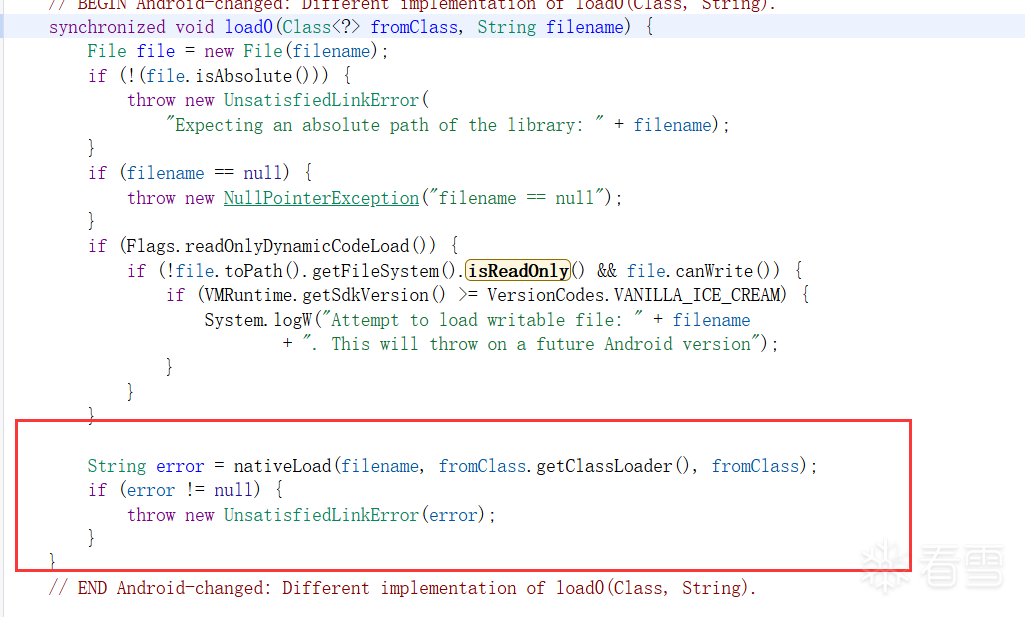
1 2 3 4 5 6 7 8 9 10 11 12 13 14 15 16 17 18 19 20 21 22 23 24 | //libcore/ojluni/src/main/java/java/lang/Runtime.java synchronized void load0(Class<?> fromClass, String filename) { File file = new File(filename); if (!(file.isAbsolute())) { throw new UnsatisfiedLinkError( "Expecting an absolute path of the library: " + filename); } if (filename == null) { throw new NullPointerException("filename == null"); } if (Flags.readOnlyDynamicCodeLoad()) { if (!file.toPath().getFileSystem().isReadOnly() && file.canWrite()) { if (VMRuntime.getSdkVersion() >= VersionCodes.VANILLA_ICE_CREAM) { System.logW("Attempt to load writable file: " + filename + ". This will throw on a future Android version"); } } } String error = nativeLoad(filename, fromClass.getClassLoader(), fromClass); if (error != null) { throw new UnsatisfiedLinkError(error); } } |
在这里去检测了对应加载过程中的sofile。然后就开始往nativeLoad函数走了
nativeLoad(filename, fromClass.getClassLoader(), fromClass);

这里直接是naitve函数了,我们要去看对应的c文件,所以要重新去搜索了,这里的搜索方法就是类名_函数名的形式,转换过程就是Runtime_nativeLoad函数
Runtime_nativeLoad
1 2 3 4 5 6 | JNIEXPORT jstring JNICALLRuntime_nativeLoad(JNIEnv* env, jclass ignored, jstring javaFilename, jobject javaLoader, jclass caller){ return JVM_NativeLoad(env, javaFilename, javaLoader, caller);} |
这里是最正常的返回,直接走 JVM_NativeLoad(env, javaFilename, javaLoader, caller)
JVM_NativeLoad(env, javaFilename, javaLoader, caller)
1 2 3 4 5 6 7 8 9 10 11 12 13 14 15 16 17 18 19 20 21 22 23 24 25 26 | JNIEXPORT jstring JVM_NativeLoad(JNIEnv* env, jstring javaFilename, jobject javaLoader, jclass caller) { ScopedUtfChars filename(env, javaFilename); if (filename.c_str() == nullptr) { return nullptr; } std::string error_msg; { art::JavaVMExt* vm = art::Runtime::Current()->GetJavaVM(); bool success = vm->LoadNativeLibrary(env, filename.c_str(), javaLoader, caller, &error_msg); if (success) { return nullptr; } } // Don't let a pending exception from JNI_OnLoad cause a CheckJNI issue with NewStringUTF. env->ExceptionClear(); return env->NewStringUTF(error_msg.c_str());} |
同样得直接向下去分析就好了 vm->LoadNativeLibrary函数
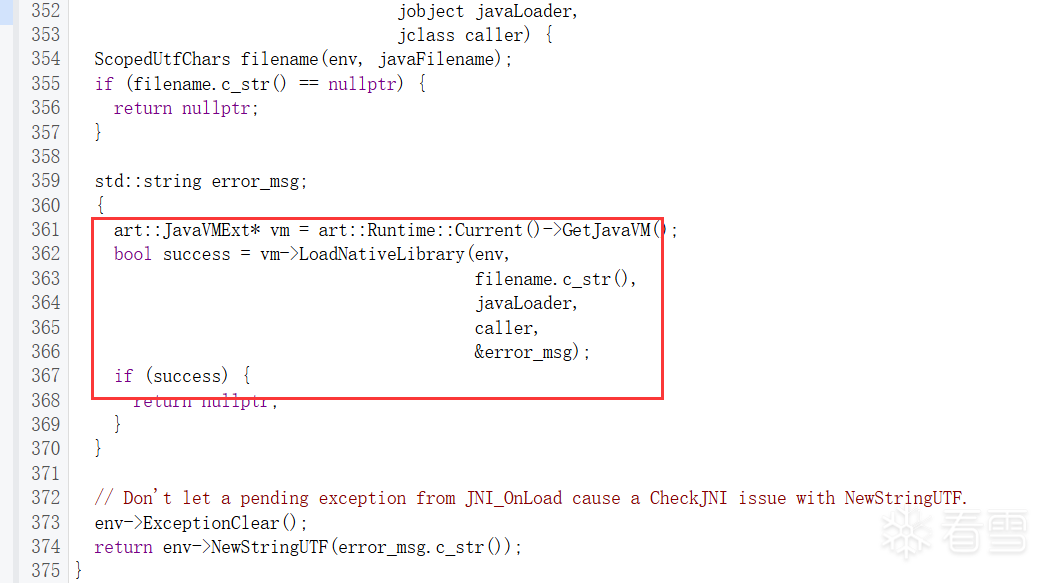
vm->LoadNativeLibrary(env, filename.c_str(),javaLoader,caller,&error_msg);
这里的大多数的函数都是对于so加载中的中途函数,也就是一层一层得调用到关键函数的,所以这里直接往下走就是了
在 JavaVMExt::LoadNativeLibrary这个函数中有需要去注意和理解的地方,同时这里也是在进行调用dlopen来进行真正so文件加载的地方。
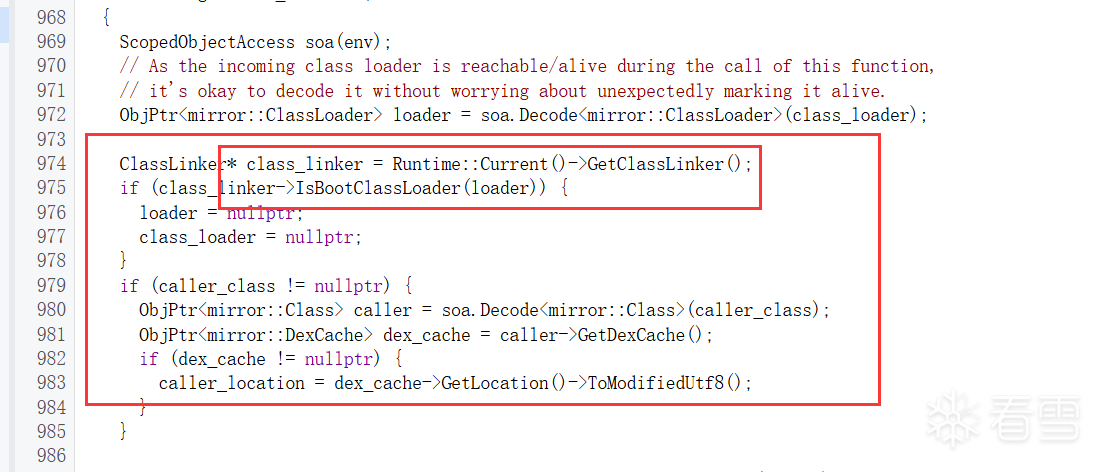
1 2 3 4 5 6 7 8 9 10 11 12 | ClassLinker* class_linker = Runtime::Current()->GetClassLinker();if (class_linker->IsBootClassLoader(loader)) { loader = nullptr; class_loader = nullptr;}if (caller_class != nullptr) { ObjPtr<mirror::Class> caller = soa.Decode<mirror::Class>(caller_class); ObjPtr<mirror::DexCache> dex_cache = caller->GetDexCache(); if (dex_cache != nullptr) { caller_location = dex_cache->GetLocation()->ToModifiedUtf8(); }} |
首先是这里的Linker的位置,这里去解码了 ClassLoader 和 Caller Class 信息,同时去判断了加载器是否为 BootClassLoader。其实在so加载过程也有借助linker判断so文件结构,链接的位置则是so文件的头部,判断的是so文件结构是否正确。

这里也去判断了这里加载的so文件是否以及被加载过了,最后开始的对于共享库so的加载(dlopen)
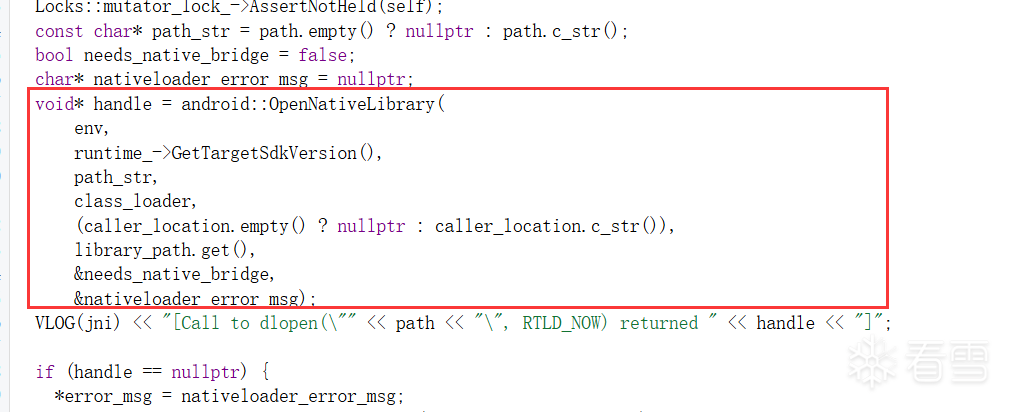
1 2 3 4 5 6 7 8 9 10 11 12 13 14 15 16 17 18 19 20 | Locks::mutator_lock_->AssertNotHeld(self); const char* path_str = path.empty() ? nullptr : path.c_str(); bool needs_native_bridge = false; char* nativeloader_error_msg = nullptr; void* handle = android::OpenNativeLibrary( env, runtime_->GetTargetSdkVersion(), path_str, class_loader, (caller_location.empty() ? nullptr : caller_location.c_str()), library_path.get(), &needs_native_bridge, &nativeloader_error_msg); VLOG(jni) << "[Call to dlopen(\"" << path << "\", RTLD_NOW) returned " << handle << "]"; if (handle == nullptr) { *error_msg = nativeloader_error_msg; android::NativeLoaderFreeErrorMessage(nativeloader_error_msg); VLOG(jni) << "dlopen(\"" << path << "\", RTLD_NOW) failed: " << *error_msg; return false; |
OpenNativeLibrary
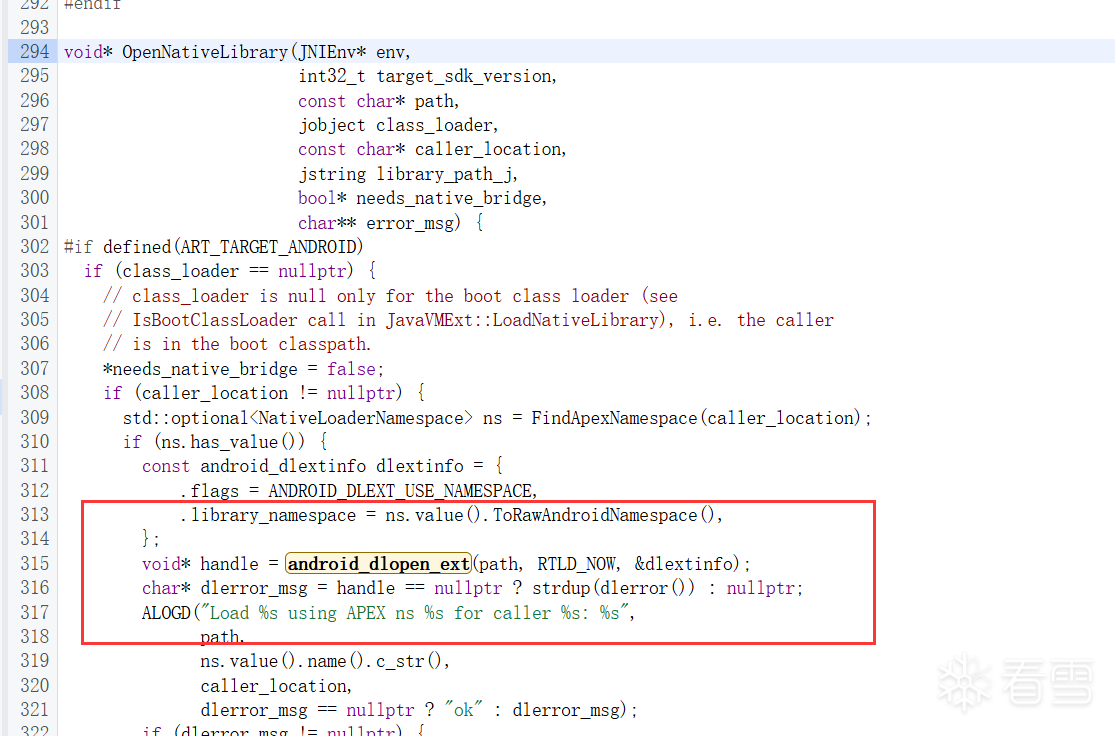
在这里开始找到了我们最为熟悉的 android_dlopen_ext(path, RTLD_NOW, &dlextinfo);函数,也就是经常进行HOOK的位置了
1 2 3 4 5 6 7 8 9 10 11 12 13 14 15 16 17 18 19 20 21 22 23 24 25 26 27 28 29 30 31 32 33 34 35 | //art/libnativeloader/native_loader.cppvoid* OpenNativeLibrary(JNIEnv* env, int32_t target_sdk_version, const char* path, jobject class_loader, const char* caller_location, jstring library_path_j, bool* needs_native_bridge, char** error_msg) {#if defined(ART_TARGET_ANDROID) if (class_loader == nullptr) { // class_loader is null only for the boot class loader (see // IsBootClassLoader call in JavaVMExt::LoadNativeLibrary), i.e. the caller // is in the boot classpath. *needs_native_bridge = false; if (caller_location != nullptr) { std::optional<NativeLoaderNamespace> ns = FindApexNamespace(caller_location); if (ns.has_value()) { const android_dlextinfo dlextinfo = { .flags = ANDROID_DLEXT_USE_NAMESPACE, .library_namespace = ns.value().ToRawAndroidNamespace(), }; void* handle = android_dlopen_ext(path, RTLD_NOW, &dlextinfo); char* dlerror_msg = handle == nullptr ? strdup(dlerror()) : nullptr; ALOGD("Load %s using APEX ns %s for caller %s: %s", path, ns.value().name().c_str(), caller_location, dlerror_msg == nullptr ? "ok" : dlerror_msg); if (dlerror_msg != nullptr) { *error_msg = dlerror_msg; } return handle; } } |
在android12中会直接由 android_dlopen_ext直接返回到 __loader_android_dlopen_ext函数,而在其他版本可以会到 mock->mock_dlopen_ext(这里会走到mock_dlopen_ext 会模拟 dlopen 的行为,同时通过flag和宏定义走到不同的函数位置)

这里我们固定在android12的位置去实现。
__loader_android_dlopen_ext
1 2 3 4 5 6 | void* __loader_android_dlopen_ext(const char* filename, int flags, const android_dlextinfo* extinfo, const void* caller_addr) { return dlopen_ext(filename, flags, extinfo, caller_addr);} |
直接的返回进入下一个函数。
dlopen_ext
1 2 3 4 5 6 7 8 9 10 11 12 13 14 | //bionic/linker/dlfcn.cppstatic void* dlopen_ext(const char* filename, int flags, const android_dlextinfo* extinfo, const void* caller_addr) { ScopedPthreadMutexLocker locker(&g_dl_mutex); g_linker_logger.ResetState(); void* result = do_dlopen(filename, flags, extinfo, caller_addr); if (result == nullptr) { __bionic_format_dlerror("dlopen failed", linker_get_error_buffer()); return nullptr; } return result;} |
同样进入do_dlopen(filename, flags, extinfo, caller_addr)
do_dlopen(filename, flags, extinfo, caller_addr)
在这个函数中附加了很多对于do_dlopen函数参数的检测和判断
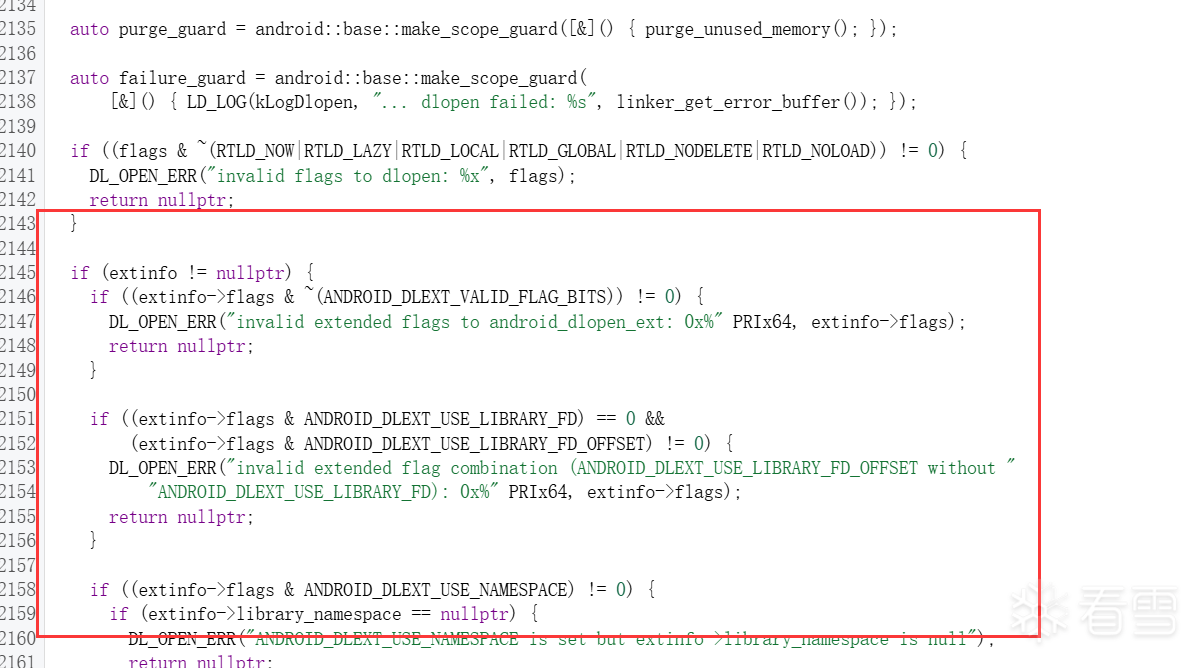
这种大面积的对于extinfo,对于so文件相关的属性进行的检测。
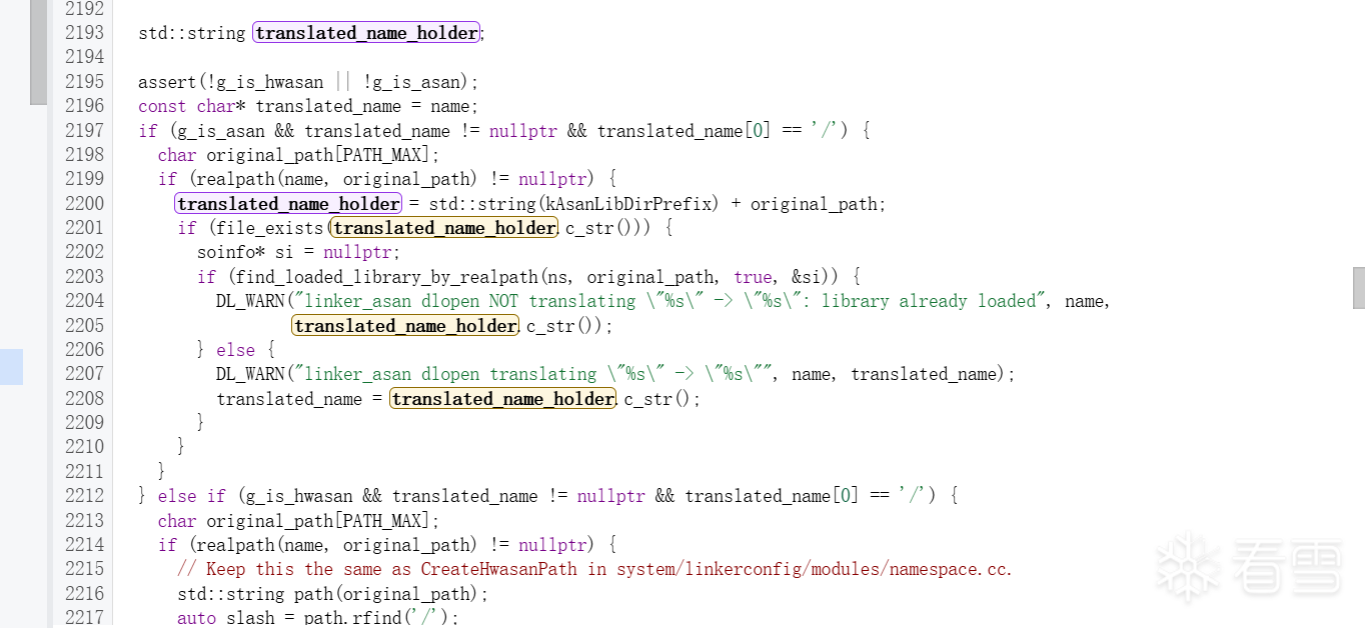
通过还对于这里的path进行了对应路径的转换和翻译。

1 2 3 | ProtectedDataGuard guard;soinfo* si = find_library(ns, translated_name, flags, extinfo, caller);loading_trace.End(); |
这里是对于do_dlopen最为重要的位置,也就是在这里去实现了对于soinfo的初始化,也就是在这开始调用so的.init_proc函数,接着调用.init_array中的函数,最后才是JNI_OnLoad函数。在很多的so文件的检测点判断中很多人也会利用这里的位置对于检测点是在JNI_OnLoad函数之前还是之后的判断依据。
继续去往find_library(ns, translated_name, flags, extinfo, caller)
find_library(ns, translated_name, flags, extinfo, caller)
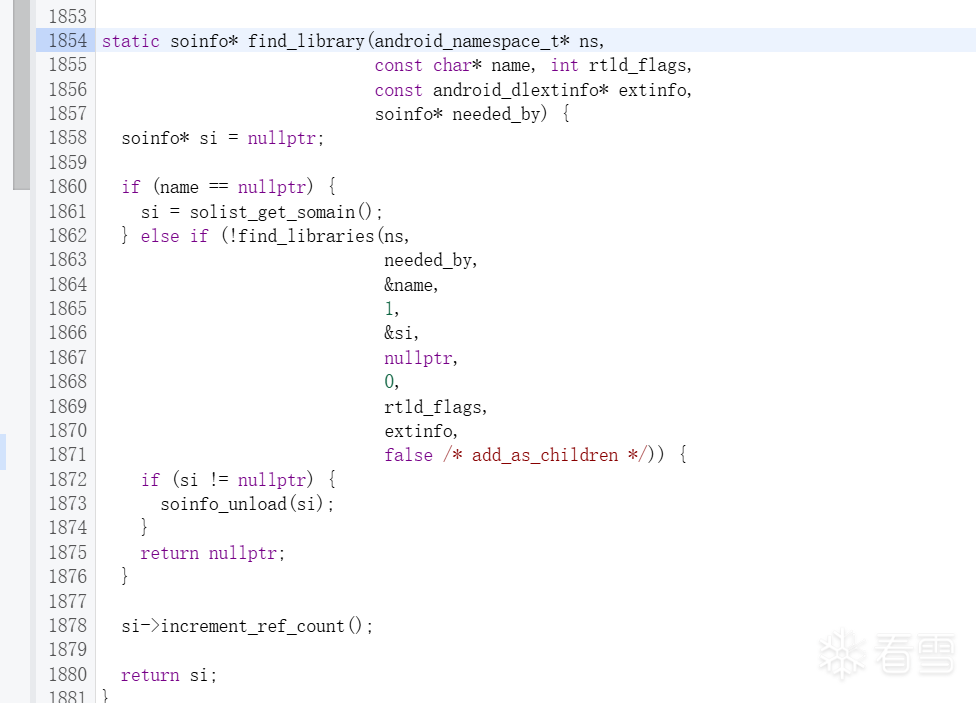
1 2 3 4 5 6 7 8 9 10 11 12 13 14 15 16 17 18 19 20 21 22 23 24 25 26 27 28 | static soinfo* find_library(android_namespace_t* ns, const char* name, int rtld_flags, const android_dlextinfo* extinfo, soinfo* needed_by) { soinfo* si = nullptr; if (name == nullptr) { si = solist_get_somain(); } else if (!find_libraries(ns, needed_by, &name, 1, &si, nullptr, 0, rtld_flags, extinfo, false /* add_as_children */)) { if (si != nullptr) { soinfo_unload(si); } return nullptr; } si->increment_ref_count(); return si;} |
这里直接往find_libraries里面就可以了
find_libraries
这个函数就是在so文件加载执行流程的最后了
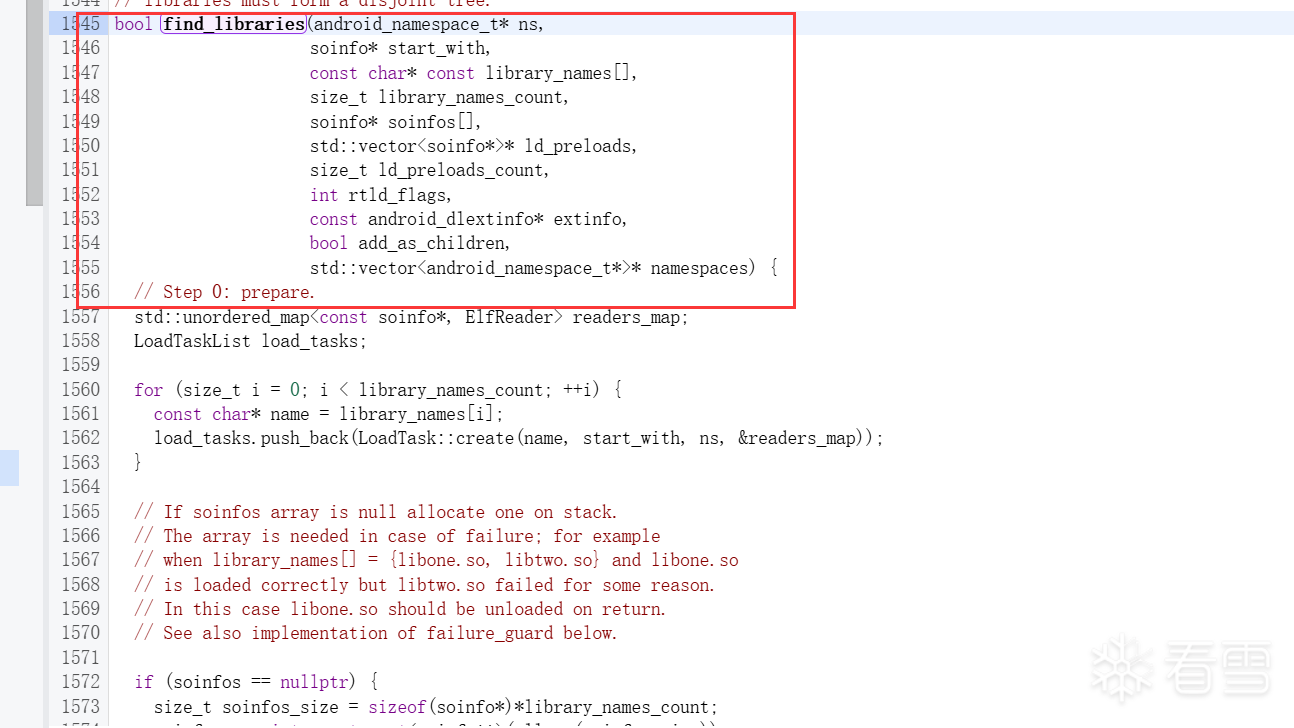
1 2 3 4 5 6 7 8 9 10 11 12 13 14 15 16 17 18 19 20 21 22 23 24 25 26 27 28 29 30 31 32 33 34 35 36 37 38 39 40 41 42 43 44 45 46 47 48 49 50 51 52 53 54 55 56 57 58 59 60 61 62 63 64 65 66 67 68 69 70 71 72 73 74 75 76 77 78 79 80 81 82 83 84 85 86 87 88 89 90 91 92 93 94 95 96 97 98 99 100 101 102 103 104 105 106 107 108 109 110 111 112 113 114 115 116 117 118 119 120 121 122 123 124 125 126 127 128 129 130 131 132 133 134 135 136 137 138 139 140 141 142 143 144 145 146 147 148 149 150 151 152 153 154 155 156 157 158 159 160 161 162 163 164 165 166 167 168 169 170 171 172 173 174 175 176 177 178 179 180 181 182 183 184 185 186 187 188 189 190 191 192 193 194 195 196 197 198 199 200 201 202 203 204 205 206 207 208 209 210 211 212 213 214 215 216 217 218 219 220 221 222 223 224 225 226 227 228 229 230 231 232 233 234 235 236 237 238 239 240 241 242 243 244 245 246 247 248 249 250 251 252 253 254 255 256 257 258 259 260 261 262 263 264 265 266 267 268 269 270 271 272 273 274 275 276 277 278 279 280 281 282 283 284 285 286 287 288 289 290 291 292 293 294 295 296 297 298 299 300 301 302 303 304 305 306 307 308 | bool find_libraries(android_namespace_t* ns, soinfo* start_with, const char* const library_names[], size_t library_names_count, soinfo* soinfos[], std::vector<soinfo*>* ld_preloads, size_t ld_preloads_count, int rtld_flags, const android_dlextinfo* extinfo, bool add_as_children, std::vector<android_namespace_t*>* namespaces) { // Step 0: prepare. std::unordered_map<const soinfo*, ElfReader> readers_map; LoadTaskList load_tasks; for (size_t i = 0; i < library_names_count; ++i) { const char* name = library_names[i]; load_tasks.push_back(LoadTask::create(name, start_with, ns, &readers_map)); } // If soinfos array is null allocate one on stack. // The array is needed in case of failure; for example // when library_names[] = {libone.so, libtwo.so} and libone.so // is loaded correctly but libtwo.so failed for some reason. // In this case libone.so should be unloaded on return. // See also implementation of failure_guard below. if (soinfos == nullptr) { size_t soinfos_size = sizeof(soinfo*)*library_names_count; soinfos = reinterpret_cast<soinfo**>(alloca(soinfos_size)); memset(soinfos, 0, soinfos_size); } // list of libraries to link - see step 2. size_t soinfos_count = 0; auto scope_guard = android::base::make_scope_guard([&]() { for (LoadTask* t : load_tasks) { LoadTask::deleter(t); } }); ZipArchiveCache zip_archive_cache; soinfo_list_t new_global_group_members; // Step 1: expand the list of load_tasks to include // all DT_NEEDED libraries (do not load them just yet) for (size_t i = 0; i<load_tasks.size(); ++i) { LoadTask* task = load_tasks[i]; soinfo* needed_by = task->get_needed_by(); bool is_dt_needed = needed_by != nullptr && (needed_by != start_with || add_as_children); task->set_extinfo(is_dt_needed ? nullptr : extinfo); task->set_dt_needed(is_dt_needed); // Note: start from the namespace that is stored in the LoadTask. This namespace // is different from the current namespace when the LoadTask is for a transitive // dependency and the lib that created the LoadTask is not found in the // current namespace but in one of the linked namespaces. android_namespace_t* start_ns = const_cast<android_namespace_t*>(task->get_start_from()); LD_LOG(kLogDlopen, "find_library_internal(ns=%s@%p): task=%s, is_dt_needed=%d", start_ns->get_name(), start_ns, task->get_name(), is_dt_needed); if (!find_library_internal(start_ns, task, &zip_archive_cache, &load_tasks, rtld_flags)) { return false; } soinfo* si = task->get_soinfo(); if (is_dt_needed) { needed_by->add_child(si); } // When ld_preloads is not null, the first // ld_preloads_count libs are in fact ld_preloads. bool is_ld_preload = false; if (ld_preloads != nullptr && soinfos_count < ld_preloads_count) { ld_preloads->push_back(si); is_ld_preload = true; } if (soinfos_count < library_names_count) { soinfos[soinfos_count++] = si; } // Add the new global group members to all initial namespaces. Do this secondary namespace setup // at the same time that libraries are added to their primary namespace so that the order of // global group members is the same in the every namespace. Only add a library to a namespace // once, even if it appears multiple times in the dependency graph. if (is_ld_preload || (si->get_dt_flags_1() & DF_1_GLOBAL) != 0) { if (!si->is_linked() && namespaces != nullptr && !new_global_group_members.contains(si)) { new_global_group_members.push_back(si); for (auto linked_ns : *namespaces) { if (si->get_primary_namespace() != linked_ns) { linked_ns->add_soinfo(si); si->add_secondary_namespace(linked_ns); } } } } } // Step 2: Load libraries in random order (see b/24047022) LoadTaskList load_list; for (auto&& task : load_tasks) { soinfo* si = task->get_soinfo(); auto pred = [&](const LoadTask* t) { return t->get_soinfo() == si; }; if (!si->is_linked() && std::find_if(load_list.begin(), load_list.end(), pred) == load_list.end() ) { load_list.push_back(task); } } bool reserved_address_recursive = false; if (extinfo) { reserved_address_recursive = extinfo->flags & ANDROID_DLEXT_RESERVED_ADDRESS_RECURSIVE; } if (!reserved_address_recursive) { // Shuffle the load order in the normal case, but not if we are loading all // the libraries to a reserved address range. shuffle(&load_list); } // Set up address space parameters. address_space_params extinfo_params, default_params; size_t relro_fd_offset = 0; if (extinfo) { if (extinfo->flags & ANDROID_DLEXT_RESERVED_ADDRESS) { extinfo_params.start_addr = extinfo->reserved_addr; extinfo_params.reserved_size = extinfo->reserved_size; extinfo_params.must_use_address = true; } else if (extinfo->flags & ANDROID_DLEXT_RESERVED_ADDRESS_HINT) { extinfo_params.start_addr = extinfo->reserved_addr; extinfo_params.reserved_size = extinfo->reserved_size; } } for (auto&& task : load_list) { address_space_params* address_space = (reserved_address_recursive || !task->is_dt_needed()) ? &extinfo_params : &default_params; if (!task->load(address_space)) { return false; } } // The WebView loader uses RELRO sharing in order to promote page sharing of the large RELRO // segment, as it's full of C++ vtables. Because MTE globals, by default, applies random tags to // each global variable, the RELRO segment is polluted and unique for each process. In order to // allow sharing, but still provide some protection, we use deterministic global tagging schemes // for DSOs that are loaded through android_dlopen_ext, such as those loaded by WebView. bool dlext_use_relro = extinfo && extinfo->flags & (ANDROID_DLEXT_WRITE_RELRO | ANDROID_DLEXT_USE_RELRO); // Step 3: pre-link all DT_NEEDED libraries in breadth first order. bool any_memtag_stack = false; for (auto&& task : load_tasks) { soinfo* si = task->get_soinfo(); if (!si->is_linked() && !si->prelink_image(dlext_use_relro)) { return false; } // si->memtag_stack() needs to be called after si->prelink_image() which populates // the dynamic section. if (si->memtag_stack()) { any_memtag_stack = true; LD_LOG(kLogDlopen, "... load_library requesting stack MTE for: realpath=\"%s\", soname=\"%s\"", si->get_realpath(), si->get_soname()); } register_soinfo_tls(si); } if (any_memtag_stack) { if (auto* cb = __libc_shared_globals()->memtag_stack_dlopen_callback) { cb(); } else { // find_library is used by the initial linking step, so we communicate that we // want memtag_stack enabled to __libc_init_mte. __libc_shared_globals()->initial_memtag_stack_abi = true; } } // Step 4: Construct the global group. DF_1_GLOBAL bit is force set for LD_PRELOADed libs because // they must be added to the global group. Note: The DF_1_GLOBAL bit for a library is normally set // in step 3. if (ld_preloads != nullptr) { for (auto&& si : *ld_preloads) { si->set_dt_flags_1(si->get_dt_flags_1() | DF_1_GLOBAL); } } // Step 5: Collect roots of local_groups. // Whenever needed_by->si link crosses a namespace boundary it forms its own local_group. // Here we collect new roots to link them separately later on. Note that we need to avoid // collecting duplicates. Also the order is important. They need to be linked in the same // BFS order we link individual libraries. std::vector<soinfo*> local_group_roots; if (start_with != nullptr && add_as_children) { local_group_roots.push_back(start_with); } else { CHECK(soinfos_count == 1); local_group_roots.push_back(soinfos[0]); } for (auto&& task : load_tasks) { soinfo* si = task->get_soinfo(); soinfo* needed_by = task->get_needed_by(); bool is_dt_needed = needed_by != nullptr && (needed_by != start_with || add_as_children); android_namespace_t* needed_by_ns = is_dt_needed ? needed_by->get_primary_namespace() : ns; if (!si->is_linked() && si->get_primary_namespace() != needed_by_ns) { auto it = std::find(local_group_roots.begin(), local_group_roots.end(), si); LD_LOG(kLogDlopen, "Crossing namespace boundary (si=%s@%p, si_ns=%s@%p, needed_by=%s@%p, ns=%s@%p, needed_by_ns=%s@%p) adding to local_group_roots: %s", si->get_realpath(), si, si->get_primary_namespace()->get_name(), si->get_primary_namespace(), needed_by == nullptr ? "(nullptr)" : needed_by->get_realpath(), needed_by, ns->get_name(), ns, needed_by_ns->get_name(), needed_by_ns, it == local_group_roots.end() ? "yes" : "no"); if (it == local_group_roots.end()) { local_group_roots.push_back(si); } } } // Step 6: Link all local groups for (auto root : local_group_roots) { soinfo_list_t local_group; android_namespace_t* local_group_ns = root->get_primary_namespace(); walk_dependencies_tree(root, [&] (soinfo* si) { if (local_group_ns->is_accessible(si)) { local_group.push_back(si); return kWalkContinue; } else { return kWalkSkip; } }); soinfo_list_t global_group = local_group_ns->get_global_group(); SymbolLookupList lookup_list(global_group, local_group); soinfo* local_group_root = local_group.front(); bool linked = local_group.visit([&](soinfo* si) { // Even though local group may contain accessible soinfos from other namespaces // we should avoid linking them (because if they are not linked -> they // are in the local_group_roots and will be linked later). if (!si->is_linked() && si->get_primary_namespace() == local_group_ns) { const android_dlextinfo* link_extinfo = nullptr; if (si == soinfos[0] || reserved_address_recursive) { // Only forward extinfo for the first library unless the recursive // flag is set. link_extinfo = extinfo; } if (__libc_shared_globals()->load_hook) { __libc_shared_globals()->load_hook(si->load_bias, si->phdr, si->phnum); } lookup_list.set_dt_symbolic_lib(si->has_DT_SYMBOLIC ? si : nullptr); if (!si->link_image(lookup_list, local_group_root, link_extinfo, &relro_fd_offset) || !get_cfi_shadow()->AfterLoad(si, solist_get_head())) { return false; } } return true; }); if (!linked) { return false; } } // Step 7: Mark all load_tasks as linked and increment refcounts // for references between load_groups (at this point it does not matter if // referenced load_groups were loaded by previous dlopen or as part of this // one on step 6) if (start_with != nullptr && add_as_children) { start_with->set_linked(); } for (auto&& task : load_tasks) { soinfo* si = task->get_soinfo(); si->set_linked(); } for (auto&& task : load_tasks) { soinfo* si = task->get_soinfo(); soinfo* needed_by = task->get_needed_by(); if (needed_by != nullptr && needed_by != start_with && needed_by->get_local_group_root() != si->get_local_group_root()) { si->increment_ref_count(); } } return true;} |
这里很长一部分的代码,在安卓源码中也有对于其进行了批注,一步一步得去加载和解析so文件,去实现so文件的加载
Step 0准备加载任务
比如在Step 0 中
1 2 3 4 5 6 7 8 9 10 11 12 13 14 15 16 17 | for (size_t i = 0; i < library_names_count; ++i) { const char* name = library_names[i]; load_tasks.push_back(LoadTask::create(name, start_with, ns, &readers_map)); } // If soinfos array is null allocate one on stack. // The array is needed in case of failure; for example // when library_names[] = {libone.so, libtwo.so} and libone.so // is loaded correctly but libtwo.so failed for some reason. // In this case libone.so should be unloaded on return. // See also implementation of failure_guard below. if (soinfos == nullptr) { size_t soinfos_size = sizeof(soinfo*)*library_names_count; soinfos = reinterpret_cast<soinfo**>(alloca(soinfos_size)); memset(soinfos, 0, soinfos_size); } |
程序去实现了对于这个加载的so文件进行的,存储于数组中,并且去实现了条件判断,假如soinfos为空,还会去实现构造了soinfo* 的结构体指针来申请一段空间来存储
Step 1解析依赖
1 2 3 4 5 6 7 8 9 10 11 12 13 14 15 16 17 18 19 20 21 22 23 24 25 26 | for (size_t i = 0; i<load_tasks.size(); ++i) { LoadTask* task = load_tasks[i]; soinfo* needed_by = task->get_needed_by(); bool is_dt_needed = needed_by != nullptr && (needed_by != start_with || add_as_children); task->set_extinfo(is_dt_needed ? nullptr : extinfo); task->set_dt_needed(is_dt_needed); // Note: start from the namespace that is stored in the LoadTask. This namespace // is different from the current namespace when the LoadTask is for a transitive // dependency and the lib that created the LoadTask is not found in the // current namespace but in one of the linked namespaces. android_namespace_t* start_ns = const_cast<android_namespace_t*>(task->get_start_from()); LD_LOG(kLogDlopen, "find_library_internal(ns=%s@%p): task=%s, is_dt_needed=%d", start_ns->get_name(), start_ns, task->get_name(), is_dt_needed); if (!find_library_internal(start_ns, task, &zip_archive_cache, &load_tasks, rtld_flags)) { return false; } soinfo* si = task->get_soinfo(); if (is_dt_needed) { needed_by->add_child(si); } |
这里 task->get_needed_by() 能够看到其实是在借用上一步得到的so文件的数组去实现检测依赖关系,因为我们知道一个so文件,在ida分析中可以看到的导入表和导出表,全是so与so之间的相互依赖来实现的。通过学习过NDK开发的也知道,在so之间的相互调用中,通过也是通过dlopen来实现。
so文件之间的调用:
1 2 3 4 5 6 7 8 9 10 11 12 13 14 15 16 17 18 19 20 21 22 23 24 25 26 27 28 29 30 31 32 | extern "C" JNIEXPORT jstring JNICALLJava_com_chen_javaandso_MainActivity_stringFromJNI( JNIEnv* env, jobject /* this */, jstring path) { std::string hello = "Hello from C++"; const char* cpath = env->GetStringUTFChars(path, nullptr);//这里是java转c++的转char函数 if (cpath == nullptr) { // 处理 JNIEnv::GetStringUTFChars 返回 nullptr 的情况 return nullptr; } void* soinfo = dlopen(cpath, RTLD_NOW);//这里去获取对应路径下的so文件的句柄 if (soinfo == nullptr) { // 处理 dlopen 失败的情况 __android_log_print(ANDROID_LOG_ERROR, "JNI", "Failed to load library: %s", dlerror()); env->ReleaseStringUTFChars(path, cpath); return nullptr; } //由于我们是通过的对应路径去查找的so文件的函数名,所以这里创建了一个函数指针去得到对应的函数句柄,然后直接调用 void (*def)(char*) = reinterpret_cast<void (*)(char*)>(dlsym(soinfo, "_Z7seconedv"));//直接去利用句柄去实现查找对应的函数,这里的函数名由于没有加上extern "C",所以会在执行过程中改变 if (def == nullptr) { // 处理 dlsym 找不到符号的情况 __android_log_print(ANDROID_LOG_ERROR, "JNI", "Failed to find symbol: %s", dlerror()); dlclose(soinfo); env->ReleaseStringUTFChars(path, cpath); return nullptr; } def(nullptr); dlclose(soinfo); // 关闭动态库句柄 env->ReleaseStringUTFChars(path, cpath); // 释放 JNI 字符串 return env->NewStringUTF(hello.c_str());} |
Step 2 随机顺序
Step2 中,安卓动态链接器采用 随机顺序 加载 SO 文件(避免固定顺序带来的漏洞)。如果 extinfo 需要 ANDROID_DLEXT_RESERVED_ADDRESS_RECURSIVE,则不会进行随机化。设定地址空间参数,比如 reserved_addr(预留地址)和 reserved_size。
Step3 预链接
1 2 3 4 5 6 7 8 9 10 11 12 13 14 15 16 | bool any_memtag_stack = false;for (auto&& task : load_tasks) { soinfo* si = task->get_soinfo(); if (!si->is_linked() && !si->prelink_image(dlext_use_relro)) { return false; } // si->memtag_stack() needs to be called after si->prelink_image() which populates // the dynamic section. if (si->memtag_stack()) { any_memtag_stack = true; LD_LOG(kLogDlopen, "... load_library requesting stack MTE for: realpath=\"%s\", soname=\"%s\"", si->get_realpath(), si->get_soname()); } register_soinfo_tls(si);} |
这里是实现预链接的位置,也是在文章之前提到实现Linker来解析ELF文件结构的地方si>prelink_image(dlext_use_relro))
1 2 3 4 | 1.检查 ELF 头的合法性,确定是有效的 ELF 文件。2.读取动态段,提取符号表、字符串表等信息。3.初始化 .got.plt 和 .rel.dyn 等重定位表,用于后续符号解析。4.解析 DT_NEEDED(依赖的库),准备后续的 link_image() 进行符号解析。 |
这也是对于ELF文件结构处理的细节位置,只有对应的so文件是完整的才能进行加载链接
1 | register_soinfo_tls(si); |
同时也将soinfo转入到了TLS中去。
Step 4 处理全局符号解析
这里去实现把在Step3中解析的符号表等等的信息来进行处理了DF_1_GLOBAL 标志的库会被添加到全局符号解析列表。如果是 LD_PRELOAD 方式加载的库,强制 DF_1_GLOBAL 以确保它能影响所有加载的库。
Step5 --- Step7
从Step5到Step7之间的这些处理就很细节了,比如有对于so文件的跨越了匿名空间的特殊处理,以及对于之前的so文件之间的依赖库的递归处理,来实现依赖so之间的函数使用。总的来说全是遍历load_tasks,之前准备的so文件,来实现的各种属性和信息的处理。
就此,整个SO文件被全部解析处理。
总结
这里我们去重新梳理一下整个so文件加载过程,现在不管是frida检测,还是更多的防护都在so文件里面,这在APP防护和加固很重要,同样破防也是。
我们首先是通过System.load()进入
1 2 3 4 | @CallerSensitivepublic static void load(String filename) { Runtime.getRuntime().load0(Reflection.getCallerClass(), filename);} |
此方法最终调用 Runtime.load0(),然后进入 nativeLoad() 函数。
Runtime_nativeLoad → vm->LoadNativeLibrary
进入 JavaVMExt::LoadNativeLibrary 方法后,最终会调用 dlopen 进行真正的 SO 文件加载。
1 | vm->LoadNativeLibrary(env, filename.c_str(), javaLoader, caller, &error_msg); |
在 Android 12 及以上版本,会调用 android_dlopen_ext 返回 __loader_android_dlopen_ext。
1 2 3 4 5 6 | void* __loader_android_dlopen_ext(const char* filename, int flags, const android_dlextinfo* extinfo, const void* caller_addr) { return dlopen_ext(filename, flags, extinfo, caller_addr);} |
该方法最终调用 dlopen_ext()。
1 2 3 4 5 6 7 8 | static void* dlopen_ext(const char* filename, int flags, const android_dlextinfo* extinfo, const void* caller_addr) { ScopedPthreadMutexLocker locker(&g_dl_mutex); void* result = do_dlopen(filename, flags, extinfo, caller_addr); return result;} |
do_dlopen(filename, flags, extinfo, caller_addr)
在 do_dlopen() 中,会调用 find_library() 进行 SO 文件的真正加载。
1 | soinfo* si = find_library(ns, translated_name, flags, extinfo, caller); |
这里是对于soinfo的赋值,同时在这里开始调用so的.init_proc函数,接着调用.init_array中的函数,最后才是JNI_OnLoad函数。最后到达find_libraries 执行最后的处理。
参考文章:
安卓so加载流程源码分析 | oacia = oaciaのBbBlog~ = DEVIL or SWEET
Android Linker学习笔记 | WooYun知识库
更多【Android安全-Android SO文件加载过程探究】相关视频教程:www.yxfzedu.com
相关文章推荐
- Android安全-HoneyBadger系列一 开篇,虚拟机调试器来了 - Android安全CTF对抗IOS安全
- 编程技术-为无源码的DLL增加接口功能 - Android安全CTF对抗IOS安全
- CTF对抗-Realworld CTF 2023 ChatUWU 详解 - Android安全CTF对抗IOS安全
- Android安全-frida源码编译详解 - Android安全CTF对抗IOS安全
- 软件逆向- PE格式:新建节并插入代码 - Android安全CTF对抗IOS安全
- 加壳脱壳- UPX源码学习和简单修改 - Android安全CTF对抗IOS安全
- 二进制漏洞-win越界写漏洞分析 CVE-2020-1054 - Android安全CTF对抗IOS安全
- Pwn-2022长城杯决赛pwn - Android安全CTF对抗IOS安全
- 软件逆向-Wibu Codemeter 7.3学习笔记——Codemeter服务端 - Android安全CTF对抗IOS安全
- Pwn-沙箱逃逸之google ctf 2019 Monochromatic writeup - Android安全CTF对抗IOS安全
- 软件逆向-Wibu Codemeter 7.3学习笔记——AxProtector壳初探 - Android安全CTF对抗IOS安全
- 企业安全-学习Kubernetes笔记——暴露站点服务(Ingress) - Android安全CTF对抗IOS安全
- 企业安全-学习Kubernetes笔记——部署数据库站点(MySql) - Android安全CTF对抗IOS安全
- 企业安全-学习Kubernetes笔记——部署web站点环境(PHP+Nginx) - Android安全CTF对抗IOS安全
- 企业安全-学习Kubernetes笔记——安装NFS驱动 - Android安全CTF对抗IOS安全
- 企业安全-学习Kubernetes笔记——kubeadm安装Kubernetes - Android安全CTF对抗IOS安全
- 软件逆向-wibu软授权(四) - Android安全CTF对抗IOS安全
- 软件逆向-使用IDAPython开发复制RVA的插件 - Android安全CTF对抗IOS安全
- 2-wibu软授权(三) - Android安全CTF对抗IOS安全
- 软件逆向-wibu软授权(二) - Android安全CTF对抗IOS安全
2):严禁色情、血腥、暴力
3):严禁发布任何形式的广告贴
4):严禁发表关于中国的政治类话题
5):严格遵守中国互联网法律法规
6):有侵权,疑问可发邮件至service@yxfzedu.com